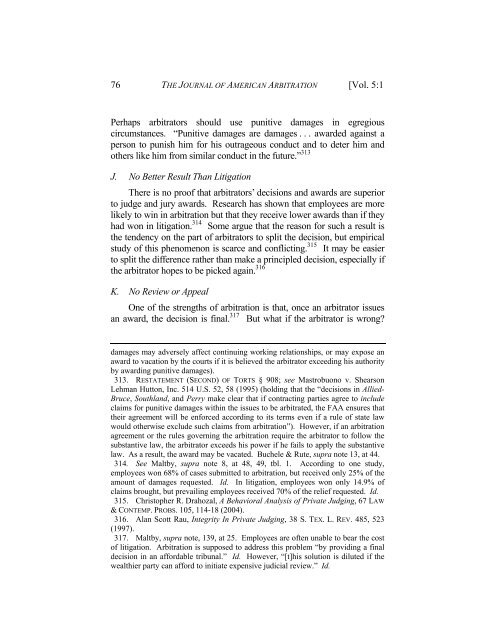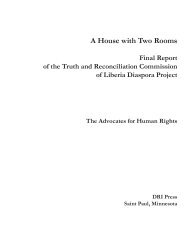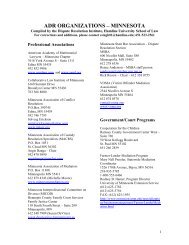2006/Vol. 5 No.1 - Hamline Law - Hamline University
2006/Vol. 5 No.1 - Hamline Law - Hamline University
2006/Vol. 5 No.1 - Hamline Law - Hamline University
Create successful ePaper yourself
Turn your PDF publications into a flip-book with our unique Google optimized e-Paper software.
76 THE JOURNAL OF AMERICAN ARBITRATION [<strong>Vol</strong>. 5:1<br />
Perhaps arbitrators should use punitive damages in egregious<br />
circumstances. “Punitive damages are damages . . . awarded against a<br />
person to punish him for his outrageous conduct and to deter him and<br />
others like him from similar conduct in the future.” 313<br />
J. No Better Result Than Litigation<br />
There is no proof that arbitrators’ decisions and awards are superior<br />
to judge and jury awards. Research has shown that employees are more<br />
likely to win in arbitration but that they receive lower awards than if they<br />
had won in litigation. 314 Some argue that the reason for such a result is<br />
the tendency on the part of arbitrators to split the decision, but empirical<br />
study of this phenomenon is scarce and conflicting. 315 It may be easier<br />
to split the difference rather than make a principled decision, especially if<br />
the arbitrator hopes to be picked again. 316<br />
K. No Review or Appeal<br />
One of the strengths of arbitration is that, once an arbitrator issues<br />
an award, the decision is final. 317 But what if the arbitrator is wrong?<br />
damages may adversely affect continuing working relationships, or may expose an<br />
award to vacation by the courts if it is believed the arbitrator exceeding his authority<br />
by awarding punitive damages).<br />
313. RESTATEMENT (SECOND) OF TORTS § 908; see Mastrobuono v. Shearson<br />
Lehman Hutton, Inc. 514 U.S. 52, 58 (1995) (holding that the “decisions in Allied-<br />
Bruce, Southland, and Perry make clear that if contracting parties agree to include<br />
claims for punitive damages within the issues to be arbitrated, the FAA ensures that<br />
their agreement will be enforced according to its terms even if a rule of state law<br />
would otherwise exclude such claims from arbitration”). However, if an arbitration<br />
agreement or the rules governing the arbitration require the arbitrator to follow the<br />
substantive law, the arbitrator exceeds his power if he fails to apply the substantive<br />
law. As a result, the award may be vacated. Buchele & Rute, supra note 13, at 44.<br />
314. See Maltby, supra note 8, at 48, 49, tbl. 1. According to one study,<br />
employees won 68% of cases submitted to arbitration, but received only 25% of the<br />
amount of damages requested. Id. In litigation, employees won only 14.9% of<br />
claims brought, but prevailing employees received 70% of the relief requested. Id.<br />
315. Christopher R. Drahozal, A Behavioral Analysis of Private Judging, 67 LAW<br />
& CONTEMP. PROBS. 105, 114-18 (2004).<br />
316. Alan Scott Rau, Integrity In Private Judging, 38 S. TEX. L. REV. 485, 523<br />
(1997).<br />
317. Maltby, supra note, 139, at 25. Employees are often unable to bear the cost<br />
of litigation. Arbitration is supposed to address this problem “by providing a final<br />
decision in an affordable tribunal.” Id. However, “[t]his solution is diluted if the<br />
wealthier party can afford to initiate expensive judicial review.” Id.
















